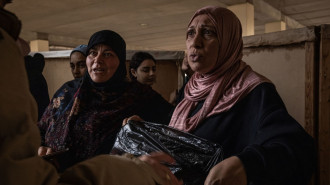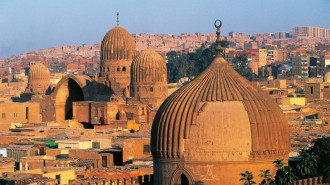
'I feel a lot of guilt': Christmas cancelled in Lebanon as festivities cease for Gaza

Perla Hraoui, 33, has a heavy chest while watching children pick toys meant as Christmas gifts from their parents. Working at a toy store for over a year, the holiday season in Lebanon is typically the busiest time for her.
This year, however, amid the ongoing Israeli war on Gaza, Perla finds it difficult to be jolly. "I feel a lot of guilt towards the children in Gaza that Israel has killed while the rest of the world moves on as if nothing has happened," she told The New Arab.
Perla despairs over the indifference of world leaders, and whilst she seeks distraction through her job, seeing joyful children excited about the holidays fills her with guilt and despair.
"The show of Christian and Muslim solidarity worldwide is key to adding international pressure on Israel to cease its aggression in Gaza and south Lebanon"
"Children in the store cry over a toy, while Palestinian children in Gaza cry over death, starvation, and fear," Perla told The New Arab. "Worst of all, there is nothing I can do about it."
Israel has killed nearly 20,000 Palestinians since the beginning of the war on Gaza on October 7. More than 50,000 people have been injured, and 8,000 children have died.
Amid the relentless Israeli attacks on innocent civilians in Gaza, the situation worsens as starvation grips the southern part of the enclave, where access to essential supplies is cut off by the expanding military assaults.
In neighbouring Lebanon, the festive season is fast approaching, with Christmas Eve on the 24th and New Year's Eve on the 31st, normally dates when the country has reason to celebrate and recoup from the worsening economic crisis that has gripped the country since 2019. However, this year, the usual celebrations are lacking, overshadowed by the sombre reality of an ongoing genocide.
|
While there are Christmas events in many parts of Lebanon, including the Asharfieh neighbourhood in Beirut and the cities of Byblos and Batroun in the north, Perla says she will not be attending any this year.
"I just feel numb on the inside, I'm trying to keep a sort of neutral attitude to not bring my family down," she said.
Hassan Mallah, a 28-year-old resident of Beirut, believes that this year, it is best to tone down the celebrations. Originally hailing from the southern region, which has been under attack by the Israeli Occupation Forces since October 7, Hassan believes solidarity is crucial at the moment.
"Southerners have lost their homes and loved ones and have been forced to flee their homes to seek refuge elsewhere. It would be nice to show them that they're not alone in their struggle and that the rest of Lebanon stands by them," he told The New Arab.
Although his family does not observe Christmas, he says the atmosphere of Christmas was more palpable last year than it is today. He adds that the show of Christian and Muslim solidarity worldwide is key to adding international pressure on Israel to cease its aggression in Gaza and south Lebanon.
When he recalls last year's Christmas in Beirut, an image of bustling crowds flocking to the Christmas markets amid the glow of lights and the tunes of music echoing through every street comes to mind. This year, he says, a pervasive sense of sadness hangs over the capital.
In the Rashidiye refugee Camp, in south Lebanon, the same sadness is compounded by grief and helplessness.
Salam Khatib, a Palestinian baker from the camp, who was usually at her busiest during the holidays has seen her work cut significantly after October 7. "I would usually be drowning in orders during this time of year," she told The New Arab. "But, until now, there are no orders at all."
She says both Muslim and Christian families would have placed their cake orders for Christmas and New Year's Eve by now.
"Everywhere you turn, there's a prevailing sense of grief. Palestine seems to be the only topic of conversation on everyone's mind"
"But the mood for celebrations is absent this year, as people would rather show support and compassion for Gaza instead. To be honest, I don't even have the same drive to work as I did before.
"Everywhere you turn, there's a prevailing sense of grief. Palestine seems to be the only topic of conversation on everyone's mind," she said.
In the neighbouring refugee camp of Al Buss, the family of Fayez Assaf is uncertain whether they will organize a small family dinner for Christmas or skip it altogether.
Being one of the few Palestinian Christian families in Lebanon, the Assafs' holiday traditions include a feast with family members to share the joy of Christmas.
However, this year, Fayez says it would be shameful to celebrate.
"It is simply not a joyful time when so many civilians are being killed. People are also fearful that the war may spread to all of Lebanon, so you can't just ignore everything happening," Fayez told The New Arab.
While the father of five considers throwing a small dinner for his children to maintain the religious tradition, he says the celebrations for New Year's can be skipped because "it is not a sacred holiday, and there will be other days in the year to celebrate."
Dana Hourany is a multimedia journalist based in Beirut
Follow her on Twitter: @DanaHourany
![Palestinians mourned the victims of an Israeli strike on Deir al-Balah [Getty]](/sites/default/files/styles/image_684x385/public/2024-11/GettyImages-2182362043.jpg?h=199d8c1f&itok=xSHZFbmc)


![The law could be enforced against teachers without prior notice [Getty]](/sites/default/files/styles/image_684x385/public/2178740715.jpeg?h=a5f2f23a&itok=hnqrCS4x)
 Follow the Middle East's top stories in English at The New Arab on Google News
Follow the Middle East's top stories in English at The New Arab on Google News


